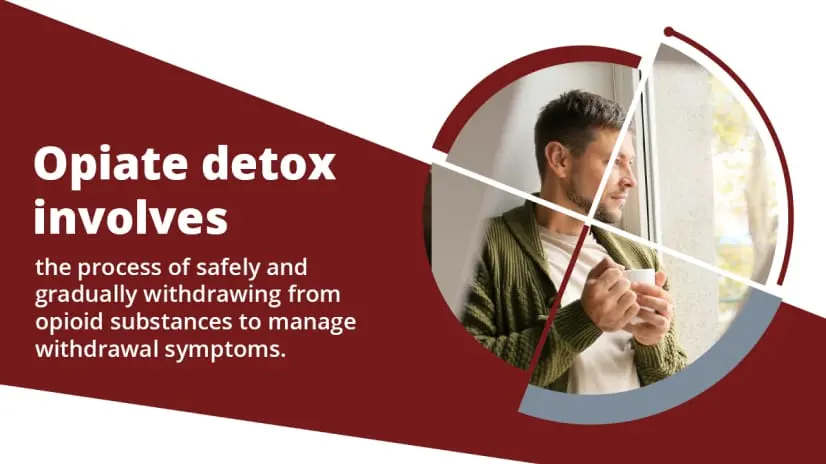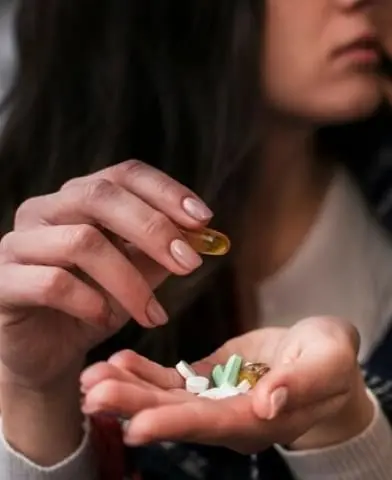
How To Detox From Opiates: Overview Of Treatment
Clinically Reviewed by:
Opiates, powerful pain-relieving drugs derived from the opium poppy plant, are known for their effectiveness but can lead to dependence and addiction. Detoxification, the process of eliminating these substances from the body, is a crucial step towards recovery.
From understanding withdrawal symptoms to implementing holistic wellness practices, this blog post aims to empower individuals with the knowledge and tools necessary for a successful opiate detox.

Key Takeaways
Opiates are a class of medications including both prescription medications like oxycodone, hydrocodone, and morphine, as well as illegal drugs such as heroin. Here’s what you need to know:
- Opiate detox involves the process of safely and gradually withdrawing from opioid substances to manage withdrawal symptoms.
- Gradual tapering under medical supervision is a safer approach for opiate detoxification.
- Detox should be followed by comprehensive addiction treatment to address underlying issues and prevent relapse.
Contact Indiana Center for Recovery at (844) 650-0064 for more information and personalized medical care to recover from opiate abuse.
What are Opiates?
Opiates are powerful prescription painkillers derived from the opium poppy plant. Common examples include morphine and codeine. These substances work by attaching to specific brain and spinal cord receptors, reducing pain perception.
Doctors often prescribe opiates to manage severe pain after surgeries or injuries. It’s important to note that healthcare professionals should carefully monitor the use of opiates and opioids to minimize the risk of dependence and other adverse effects. Misuse of these substances has been a significant public health concern due to the opioid epidemic, which involves a widespread increase in opioid-related overdoses and addiction.
Understanding Opiate Addiction
Opiate addiction is a chronic, relapsing disorder characterized by compulsive drug-seeking and use despite harmful consequences. It develops when repeated opiate exposure changes the brain’s structure and function.
Individuals may become dependent, experiencing withdrawal symptoms when not using opiates. Addiction can affect anyone, regardless of age or background.
Opiate Detoxification Process
Medical detoxification from opiates is a crucial process that helps individuals safely manage withdrawal symptoms and break free from opiate dependence. This active process involves several key steps to ensure a smooth and secure transition towards recovery.
Assessment
The first step in medical detox is a comprehensive assessment of the individual’s health and substance use history. This information helps medical professionals tailor the detox plan to meet specific needs.
Stabilization
Once assessed, the focus shifts to stabilizing the individual. Medications may be administered to alleviate symptoms of withdrawal, ensuring a more comfortable and controlled detoxification experience.
Medication-Assisted Treatment (MAT)
Medications like methadone, buprenorphine, or naltrexone may be used as part of a medication-assisted treatment plan. These medications help manage cravings for short-acting opiates and reduce the risk of relapse during detox.
Monitoring
Continuous monitoring is crucial throughout the detox process. Healthcare professionals closely observe vital signs, symptoms, and overall well-being to adjust the treatment plan.
Emotional Support
Opiate detox is not only physically but also emotionally challenging. Emotional support is provided through counseling and therapy to address the psychological aspects of addiction and develop coping strategies.
Nutritional Support
Maintaining proper nutrition is vital during detox from synthetic drugs. A balanced diet helps restore physical health, supporting the body in its recovery from the toll of substance use.
Hydration
Adequate hydration is essential to flush toxins from the body. Medical professionals ensure that adults undergoing detox remain well-hydrated to support their overall health.
Gradual Tapering
In some cases, a gradual tapering of long-acting opiates may be employed, slowly reducing the dosage to minimize withdrawal symptoms and prevent severe discomfort.
Transition to Further Treatment
Detoxification alone is not sufficient for long-term recovery. Following successful detox, individuals are encouraged to engage in further treatment, which may include residential or outpatient rehabilitation programs, counseling, support groups, and other forms of ongoing care.
It’s important to consult with healthcare professionals to determine the most appropriate and safe approach to opioid detoxification based on individual circumstances. Seeking medical guidance and support is crucial to managing withdrawal symptoms and promoting a successful recovery.
Post-Detoxification Road to Recovery
Embarking on the recovery journey after detoxification is crucial in reclaiming a healthier and more fulfilling life. Various components mark this stage, each pivotal in ensuring a sustained and successful recovery.
Importance of Aftercare to Sobriety
Aftercare stands as a cornerstone in the foundation of sobriety. It extends beyond detox and helps individuals navigate the challenges that may arise post-treatment. Regular check-ins, counseling sessions, and support groups are integral components of aftercare, providing a safety net for those in recovery.
Engaging in aftercare significantly reduces the risk of relapse. It acts as a guiding force, offering ongoing assistance tailored to individual needs. Whether through therapy or group activities, aftercare reinforces the skills acquired during detox and equips individuals with tools to confront life’s complexities without resorting to substances.
Coping Mechanisms and Lifestyle Changes
The path to recovery involves adopting coping mechanisms and making positive lifestyle changes. Learning to cope with stress, triggers, and emotional upheavals is essential. Simple yet effective techniques like deep breathing exercises, mindfulness, and regular physical activity empower individuals to face challenges head-on.
Lifestyle changes play a pivotal role in breaking the cycle of substance abuse. Establishing a routine, incorporating healthy habits, and setting realistic goals contribute to a stable recovery trajectory. By replacing destructive behaviors with constructive ones, individuals create a foundation for lasting change.
Finding Support in Recovery
The journey to recovery should never be a solitary one. Finding support from friends, family, and support groups fosters a sense of belonging and understanding. Connecting with others with similar experiences creates a support system that becomes a lifeline during challenging moments.
Support can manifest in various forms, from attending 12-step support group meetings to reaching out to a sober buddy. A reliable network reinforces the commitment to sobriety and encourages it during difficult times. The shared experiences within these networks remind individuals that they are not alone in their journey.
Frequently Asked Questions (FAQ)
The initial steps in opiate detox involve seeking immediate medical intervention for opioid withdrawal. Professional medical treatment is crucial to manage symptoms and ensure a safe detox process. Consult with healthcare experts to determine appropriate prescription medications for pain relief during withdrawal.
Family members can provide emotional support throughout the recovery journey. Avoid self-detox and rely on healthcare professionals to address opioid use disorder, incorporating clinical trials for effective treatment approaches.
Opiate detox withdrawal symptoms may include intense cravings, high blood pressure, rapid heart rate, muscle aches, insomnia, nausea, vomiting, diarrhea, and excessive sweating. Psychological symptoms such as depression and irritability are common, along with flu-like symptoms. Patients may experience life-threatening symptoms, emphasizing the need for professional intervention.
Opioid withdrawal symptoms, such as those experienced during opiate use cessation, can be challenging. Some may seek relief with over-the-counter medications.
However, attempting detox without professional medical help can pose risks, and research studies emphasize the importance of seeking professional help. For example, the symptoms of opiate withdrawal may include intense cravings and physical discomfort, highlighting the necessity of a tailored and supervised approach to overcome opioid addiction.






 100% Confidential
100% Confidential